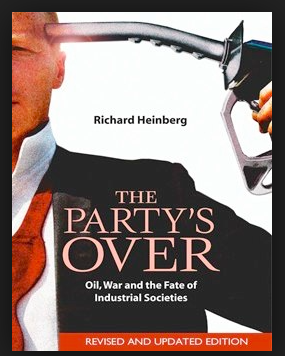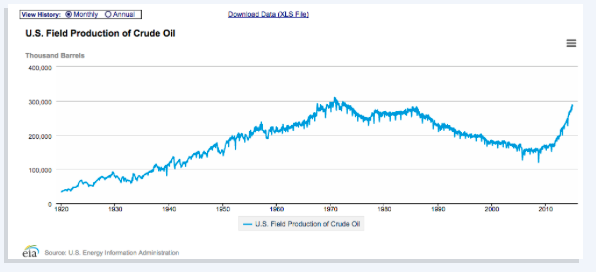
Remember those many years ago — circa 2005 — when Peak Oil was all the rage, and people like me were routinely ridiculed by the Church of Environmentalism for writing articles such as this one?
Well, you won’t believe it, but it looks as though some of that leftist dogma was perhaps incorrect after all.
The following excerpt comes from the Institute for Energy Research (IER), in a recent article called “Peak Oil theory may have peaked“:
The chart above shows why Hubbert was considered such a visionary, at least for a while. After his 1956 prediction, U.S. production did indeed rise and then peak just in time for the window Hubbert had given himself. The gentle decline in U.S. production from the mid-1970s through the early 2000s was also consistent with Hubbert’s theory, which treated the total national output as an aggregation of individual wells, each with a technically defined, bell-shaped curve lifecycle of output.
Yet as the chart also shows, the nice bell shape started turning around in 2009 and took off like a rocket in 2011. Looking at monthly figures, U.S. field production of crude in December and January were the highest values since 1972, and not far behind the all-time record set in 1970. Although the sharp decline in the world price of oil since last year may halt the rapid spike in U.S. output, it is obvious from the chart that the mechanistic model of “peak oil” theory is incorrect.
“Finite” Resources Never Run Out With Enough Ingenuity
The fundamental problem with “peak oil” theory is that it adopts a Malthusian mindset, in which we view humanity as the stewards of a single pool of oil that gets smaller every time we burn a barrel.
Please read this article to find out why the “Malthusian mindset” is not just incorrect but so wildly incorrect.


I will posit: one usually gets what one expects. In economics, graphs and charts usually reflect what the creator expects. In philosophy and spirituality, one usually gets what she expects. In physics, the observer tends to see what he expects. Behind a telescope, however, averted vision usually reveals much more than expected. Theory doesn’t scare me. “Scientific conclusions” do.
Hi Dy!
I didn’t see your comment until just now. Thank you.
And thank you for dropping by.
Physicist Neils Bohr famously said “It’s difficult to make predictions, especially about the future.” In fact it’s almost impossible, especially about technology. For example computing power is doubling every 18 months and in perhaps ten years from now, computers will be (ballpark) 64 times more powerful. Who knows what’s going to happen then.
The only prediction I’m willing to risk is that couch potatoes won’t have to get up and go to the fridge. The fridge will come to you.
As far as oil goes, fracking technology today is ten times as sophisticated and probably a lot more efficient and economical than it was ten years ago — and definitely a lot more environmentally friendly; just google “image jonah field wyoming” and compare it with modern fracking wells. In ten years time fracking technology will likely have made major improvements again.
So yes, I am prepared to predict that technology will be cheaper, more efficient and more ubiquitous in the future, and if we need more oil, technology will find a way.
But I’ve learned not to make predictions like “They surely can’t get any stupider than this” because the forons take it as a challenge.
Not only that, my friend, but technology begets technology — which is to say: the more we develop today’s technology, the faster we find the technology of tomorrow.
Blasting us back to the Stone-Age, as the cult of environmentalism wants, will not in a million light years advance technological progress.
Thank you for dropping by.
Great post Ray, you should also mention that Bob blogs at Mises dot ca on a regular basis!
Are you coming out to Rothbard U?
Well, well, well! If it isn’t my old friend Red. How are you?
Robert Murphy — i.e. Dr. Bob — does indeed blog regularly at Mises.ca, and, as a matter of fact, I really enjoyed one of his most recent.
I’m afraid I won’t physically be at Rothbard U, but I’ll be with you in spirit.
Thank you for dropping by.
P.S. Word to your mother.